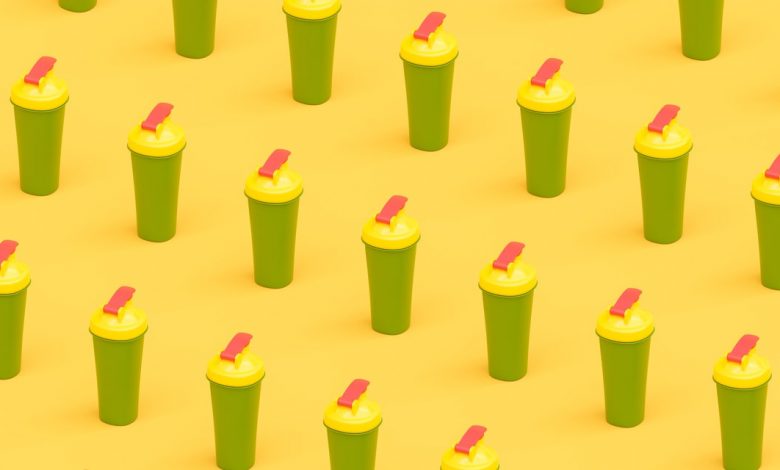How Many Protein Shakes Per Day Is Too Many?

When you’re pressed for time, it’s easy to reach for a bottle to fuel up. But that begs the question: How many protein shakes a day is okay to drink?
While these beverages should never be the centerpiece of your diet—you want the majority of your nutrients to come from whole food sources, as registered dietitian and certified specialist in sports nutrition Amy Stephens, MS, RDN tells SELF—they certainly can have a place in your day, especially if intense physical activity leaves you with a hankering for more of that macro. For example, downing a post-workout shake (ideally along with a carb source) is a quick and convenient way to accelerate recovery and jumpstart muscle protein synthesis, or the fancy term for muscle growth, Jessica Isaacs, RD, CSSD, a sports dietitian who specializes in performance nutrition for elite athletes, tells SELF. Many of the athletes she works with find that ready-to-drink shakes help them get enough protein when they don’t have the appetite to tuck into a plate of chicken (or the time, really). In fact, that’s why these beverages came about in the first place, Stephens says: As an efficient means “to obtain those nutrients without having to make food.” Used to supplement a balanced diet, a shake can help satisfy your daily protein requirement and provide the essential amino acids your body needs to build muscle mass or simply recover better. Yes, all by mixing some liquid and protein powder in a shaker bottle or chugging a grab-and-go option.
With that background info in mind, what should be your daily cap? Unlike the answer to the question “Are protein shakes actually good for you?,” this one is simple: It should be a one-and-done thing for the average person. “We really don’t need more than one a day,” Isaacs says. “The rest [of our nutrients] should come from food.”
In fact, drinking more than one protein shake per day means you’re “losing out on all those other nutrients that you might be getting if you’re eating food,” Stephens says. Nutritionally speaking, whole foods contain a diverse mix of nutrients that many protein shakes just can’t replicate, no matter how fortified they are. We’re not just talking about macronutrients like carbohydrates and healthy fats (and, of course, protein), but also micronutrients like vitamins and minerals. Because this diversity is key to strengthening your gut microbiome, whole foods are your best bet from a gut health standpoint, which, as research suggests, may also affect other facets of your well-being like your mental state and immune system. Basically, shakes tend to be an amazing source of protein, but not much else.
What’s more, overprioritizing protein shakes, in turn, could affect the state of your stomach, including how easily and frequently you poop. For example, lots of them lack fiber, so stacking your diet with these beverages could increase your risk of constipation, setting you up for a tough few bathroom trips. Or, it could push you over to the other extreme. Some shakes contain ingredients (like artificial sweeteners or sugar alcohols) that can cause digestive issues—-so the more you drink, the more likely you are to experience side effects like bloating, gas, and diarrhea if you have a sensitive stomach.
Of course, that one-per-day recommendation comes with some caveats, since the amount of protein people need can differ across the board for a wide range of reasons. For example, folks who have chronic kidney disease may be told to reduce their daily protein intake because their kidneys have trouble filtering out the resulting waste, Jason Machowsky, MS, RD, a sports dietitian and registered clinical exercise physiologist, tells SELF—so even one shake could theoretically pile on too much protein for their organs to comfortably handle if they’ve already met their daily limit. On the other end of the spectrum, very physically active people, like athletes, likely need extra protein to maximize recovery and muscle growth. Besides, the actual amount you’re taking in differs between shakes (though you typically want to shoot for 10 to 20 grams of protein if you’re drinking one as a snack between meals rather than a meal substitute), so multiple drinks at the lower end of that range could deliver the same protein content as one at the higher end. In other words, “it’s hard to generalize,” Isaacs says.
For that reason, don’t feel completely tied down when it comes to the earlier gen-pop guidance: For those who have higher protein needs—say, you’ve got lofty fitness goals that have you working out hard and often—it may well be just fine to drink more than one shake per day, according to Isaacs. “In situations where time is limited, appetite is reduced, or there’s a need for quick recovery after a workout before a meal, protein shakes can be a convenient option,” she says.
The bottom line: Whether you’re sticking to one protein shake a day, or you’re edging above it thanks to higher dietary protein requirements, you should still consider what you’re drinking a complement to your meals rather than something to replace them entirely, Isaacs says. Otherwise, you may be “missing out on important nutrients,” she adds. Sure, there may be special cases “where someone would need more or less,” Machowsky says, but if that’s the situation, you should consult a professional—say, a registered dietitian nutritionist—for medical advice. And if you’d prefer to get your protein from solids rather than liquids but want to nibble on something a little less dull than a protein bar, check out this list of 22 high-protein snack ideas.
Related:
- The 12 Best Protein Powders in 2024, According to Experts
- Supplements That Promise to Make You Prettier, Healthier, Better Are Everywhere. Here’s What the Science Says
- The Best Strength-Training Exercises for Beginners to Get Stronger
Get more of SELF’s great wellness advice delivered right to your inbox—for free.



